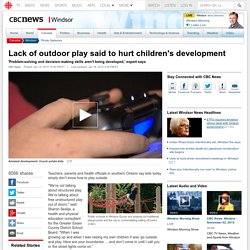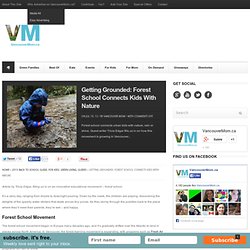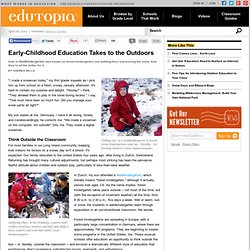

A Potential Natural Treatment for ADHD. Lack of outdoor play influencing development? Teachers, parents and health officials in southern Ontario say kids today simply don't know how to play outside.

Public schools in Windsor-Essex are phasing out traditional playgrounds and the city is contemplating selling off parks. (CBC) "We’re not talking about structured play. We’re talking about free unstructured play out of doors," said Sharon Seslija, a health and physical education consultant for the Greater Essex County District School Board. "When I was growing up and when I was raising my own children it was ‘go outside and play. "So, the kids developed imagination, played with kids in the neighbourhood and developed problem solving skills.
Seslija said modern neighbourhoods don't encourage outdoor play. "In some suburban areas, you’re lucky if you have a sidewalk," she said. Province funds 'outdoor education' The Ontario Ministry of Education has provided school boards additional funding for “outdoor education” for the past two years.
"Form follows function. iPad baby seat. Connecting to nature. We all need risk in our lives...encourage it. Megan, aged nine, enjoys getting muddy in the woods.

Children are more likely to flourish when allowed to indulge in “risky play” outdoors unhindered by excessive adult supervision, a new report suggests. Education experts spent a year studying a group of 13 children from Meadowlane Primary School in Cardiff as part of a Forest School programme to assess how our woodlands can help their development. The report concluded that children were adept at policing themselves and were more likely to learn from the environment around them if permitted to play without too much adult interference. Cathy Velmans, a Forest School Leader with the Forestry Commission Wales Woodlands for Learning (WfL) team, said, “The children valued their free time and self-directed play.
“This ‘risky play’ was managed through discussion with the children and the nurturing of positive self-regulation. Forest Kindergarten at Waldorf School in Saratoga Springs. Why children NEED unsupervised play. Thoughts from a Vancouver Mom. Forest school connects urban kids with nature, rain or shine.

Guest writer Tricia Edgar fills us in on how this movement is growing in Vancouver... Article by Tricia Edgar, filling us in on an innovative educational movement – forest school. It’s a rainy day, ranging from drizzle to downright pouring. Down by the creek, the children are playing, discovering the delights of the speedy water striders that skate across tiny ponds. As they stomp through the puddles back to the place where they’ll meet their parents, they’re wet – and happy. Forest School Movement The forest school movement began in Europe many decades ago, and it’s gradually drifted over the Atlantic to land in places across North America. What is forest school? Connecting Your Child With Nature. Taking it to the outdoors ! Kids in Waldkindergarten, also known as forest kindergarten, are building fires and braving the snow.

And they're all the better for it. Chilling Out: At a Waldkindergarten in Zurich, forest kindergartners gear up -- literally -- for learning outdoors. Credit: Waldkindergarten "I made a snowman today," my first grader squeals as I pick him up from school on a fresh, snowy January afternoon. My son stares at me. Think Outside the Classroom For most families in our Long Island community, keeping kids indoors for recess on a snowy day isn't a shock; it's expected. Gathering Place: At the Waldsofa, a parent-built roofless structure, teachers and kids meet daily to learn, explore, and cook their lunch. In Zurich, my son attended a Waldkindergarten, which literally means "forest kindergarten," although it actually serves kids ages 2-6.
Switzerland children exploring the outdoors. Courtesy Rona Richter In their new book, The App Generation, education professors Howard Gardner and Katie Davis argue that kids today are becoming more risk averse. “Rather than wanting to explore, to try things out by themselves, young people are always pushing to find out exactly what is wanted, when it is wanted, how it will be evaluated, what comes next and where we end up,” they said in a recent Q-and-A. I was on a panel with Gardner in November, and he made a related observation: Many kids today have never gotten physically lost. They have never been outside, in an unfamiliar place, without a parent or a GPS or a phone app to guide them.
They don’t know what it’s like to lose your way in the world around you and to make do until you find it again. Getting lost can be scary for kids (and for parents looking for children they can’t spot). And yet, somewhere in our hearts, plenty of parents know that just can’t be right— not all the time, anyway. Problem solving and teamwork in action.